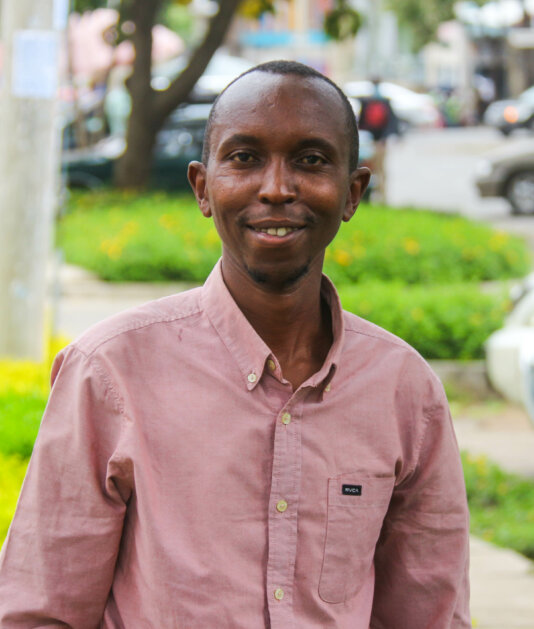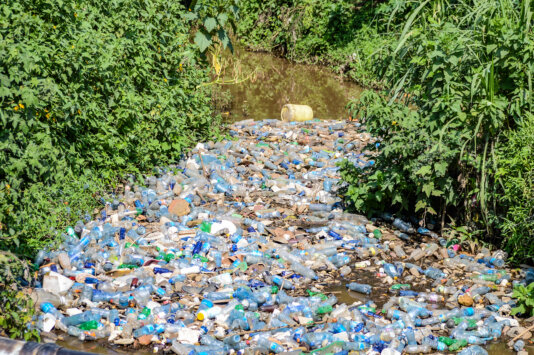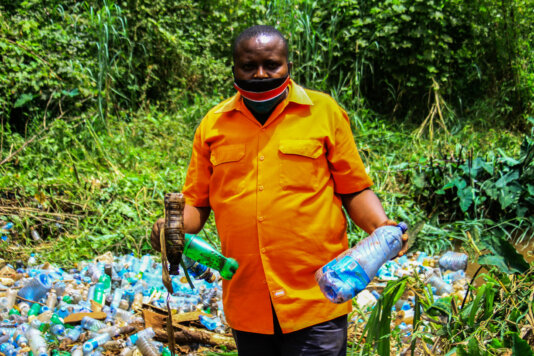- About
- Topics
- Story
- In-Depth
- Picks
- Opinion
- News
- Donate
- Signup for our newsletterOur Editors' Best Picks.Send
Read, Debate: Engage.
| October 20, 2020 | |
|---|---|
| topic: | Ocean Pollution |
| tags: | #James Wakibia, #plastic, #pollution, ##banplasticsKE |
| located: | Kenya |
| by: | Bob Koigi |
Only a mere nine percent of all discarded plastic is recycled. Researchers now say that approximately 1.3 billion tonnes of plastic will be in our oceans and dumped on land by 2040, if we do not do something about it.
James Wakibia, a Kenyan photographer and environmental activist is doing something about it. Disturbed by the plastic pollution in his home town of Nakuru in Kenya’s Rift Valley, he has been running a series of campaigns calling on both national and county governments to address the problem. In 2015 he launched the #banplasticsKE campaign on Twitter to pressure the government to ban plastic bags. Two years later Kenya became one of the first African countries to institute a ban on single use plastics.
Mr. Wakibia spoke to FairPlanet about his environmental activism, his message to the global community and his fears over an alleged US-Kenya trade deal that could erode the gains made in tackling plastic pollution.
FairPlanet: About five years ago you started the #banplasticsKE campaign through social media, which eventually contributed to one of the most historic moments for Kenya and East Africa; the nationwide ban on single-use plastic bags. What inspired you and the movement and how has been the journey so far?
James Wakibia: I felt irked by so much pollution in my home town that I decided to speak up and demand change. The journey has been tough for me personally. During that period, there were lots of ups and downs, but the future is promising and greener too.
How serious has the plastics issue in Kenya been?
Plastic pollution is a nightmare here. Despite the plastic bags ban, we still have so much plastic — especially plastic drink bottles — Styrofoam, and other single-use plastics polluting our rivers and lakes and there are very few efforts to find a lasting solution to this headache. Its something that should be a concern to everybody.
It’s almost three years since the ban came into effect.Have there been any tangible results? What has not been achieved?
The plastic bag ban did work some wonders. Places like streets, drains, rivers previously clogged by plastic bags are better now, and even trees have little to no multicoloured plastic bags clinging to them. I feel it is now too early to celebrate because we still have lots of other plastic suffocating life in our rivers, lakes and oceans. There is also the challenge of having neighbouring countries who have not outlawed plastic bags, which means implementation of the ban here may suffer some setbacks.
As a young avid environmental activist at a time when pollution, especially plastic has become a global threat to human health, the environment, and aquatic life, do you think governments and the international community have done enough to stem this threat?
I feel the global community is not doing enough. There is still a lot of laxity even with availability of scientific evidence of plastic becoming a global environmental crisis. Governments all over the world have a responsibility of protecting the environment and this must become a collective responsibility, but when some global leaders refuse to sign pacts on mitigating plastic pollution and calling climate change a hoax you can tell we have serious problems.
In your opinion, how would you want it done differently?
Governments should work together to mitigate plastic pollution through established structures like the Basel Convention. I also would like this treaty expanded to address plastic pollution as a whole, and not just a single aspect of it.
What is your message to the global community on plastic pollution?
Plastic pollution is growing by the day and we can’t assume everything is okay and move on with life. The time to bury our heads in the sand is up. I have witnessed first-hand the immense damage plastic is causing our environment and therefore we must work together as a global community to curb plastic pollution.
Plastic industries should design products with lower environmental impact, they should think more about the end of use of their products and stop merely being producers. They ought to be responsible producers. Governments should draft policies to safeguard the environment and implement those policies. And I urge governments to introduce bans on single-use plastics, which are like little bombs everywhere waiting to explode.
As a young activist what would you say is the place and space of the youth in the plastic pollution debate?
The youth should stand up now and fight for their future. They are at a time in history where most things can work in their favour if they rise up and make their voices count. I am happy with Fridays For Future and Extinction Rebellion and many other youth-led movements springing up all over the globe to champion for environmental protection.
I am happy with the work of Greta Thunburg from Sweden, Elizabeth Wathuti from Kenya, Sadrach Nirere from Uganda and many young people across the world fighting for a better planet. The youth have the best communication gadgets and platforms at their disposal, they can use these tools to call out for the much needed changes. A click away and their voice will be heard, I know it, I have done it, they too can! The future is better in the hands of the youth. It is their future they will be fighting for.
There have been fears that plastics may be introduced in the country as part of the Kenya-US trade deal. What is your reaction to this news and what does this portend for your activism and pursuit to rid the country of plastics?
News that USA Plastic and Chemical lobby group wants trade negotiators to ask Kenya to relax or suspend the ban on plastics in Kenya is outrageous and sad too. Kenya has made many positive environmental gains since it banned plastic bags, we cannot comprehend going back to where we came from. We cannot accept America making Kenya and Africa its plastic dumping ground. We have enough plastic accumulating and destroying our environment already and therefore it would be crazy to lift the plastic ban and go slow on plastic waste policies.
If America is good at recycling and managing its plastic waste, why does it ship tonnes of its waste away to poor nations? How will poor nations cope? They are already suffocating from plastic waste.
It will be a big blow to me, having spent lots of years campaigning for the ban. If it happens and God forbid, I will cease any more plastic campaigns and activism at large and be an ordinary guy just like anybody else.
With photography and new media being credited in part for the success of your activism, how do you think they should be harnessed to advocate for a ban in hazardous waste and protection of the environment?
True, Social media and photography have played a big role in my activism. Social media is a powerful platform that can be used to bring change. Young people should embrace social media
What are your plans and aspirations in the environment activism journey moving forward?
I dream of a world with less plastic pollution, I know it’s not something that will happen overnight but I am determined to make myself and those speaking out about the issue heard far and wide. I have a lot of optimism that the world is waking up to the realisation of the importance of safeguarding our environment. When we protect the environment the environment will protect us, if we injure it, it will return the favour in far-reaching ways. Today I am working with FlipFlopi an organisation that built a boat using plastic trash and successfully sailed it from Lamu, Kenya to Zanzibar, Tanzania: a 500 km journey. Together we are calling East Africa member countries to ban unnecessary single-use plastics in their territory. The FlipFlopi boat, one of its kind in the world, will be sailing across Lake Victoria in Kenya, Uganda and Tanzania spreading awareness on plastic pollution and petitioning the East African countries to ban single-use plastics.
My mantra is less plastic is fantastic!
By copying the embed code below, you agree to adhere to our republishing guidelines.



